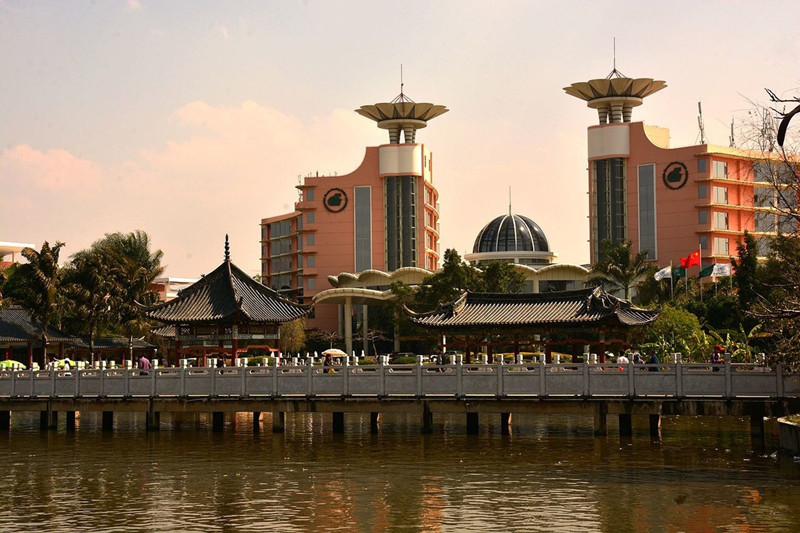Overview
Taiping Lake Forest Park (太平湖森林公园, Tàipíng Hú Sēnlín Gōngyuán) is situated in Mile City (弥勒市, Mílè Shì), Honghe Prefecture (红河州, Hónghé Zhōu), a picturesque area in southern Yunnan Province (云南省, Yúnnán Shěng). Spanning an area of 42 square kilometers (approximately 16.2 square miles), this park is characterized by its dense forest vegetation and a high concentration of negative oxygen ions, making it an ideal location for health and wellness activities. The park integrates various functions, including sightseeing, tourism, vacationing, entertainment, conferences, sports events, and wellness activities, presenting itself as a world-class plateau forest health resort park that is ecological, intelligent, and internationalized.
Park Features
The park is designed around eight major attractions, each offering unique experiences:
1. Characteristic Forest Cabin Town
This area focuses on developing and showcasing traditional wooden cabins, blending cultural heritage with modern design. The project aims to create the largest collection of resort cabins in China, featuring wooden culture at its core. The development includes the integration of local villages to promote tourism and enhance the regional economy through smart wooden cabins and community renovations.
2. Love-Themed Cultural Park
At the heart of this park is an international royal rose garden, complemented by stunning church architecture, royal carriages, and equestrian facilities. This area provides a romantic setting for wedding photography, film shoots, ceremonies, and various leisure activities.
3. Earth Art Landscape Park
Home to the largest flower sea scenic area in Southwest China, this park features installations by international earth artist Stan Herd (斯坦·赫德, Sītǎn Hèdé). His Asian debut artwork, “Young Chinese Women,” is showcased here, along with a rare plant garden. The park promotes a one-stop tourism model centered around flower-themed attractions and agricultural art.
4. Plateau Sports Training Base
This facility features a 21.1-kilometer running track around the lake, designed for professional half-marathon events and cycling training. Additional recreational facilities support various outdoor activities and ecological initiatives aimed at protecting water sources and restoring the local environment while promoting a healthy lifestyle.
5. Plateau Agricultural Demonstration Base
Focusing on the promotion of local specialty agriculture, this base aims to enhance the international competitiveness of Yunnan’s agricultural products. It covers about 2,000 acres and emphasizes education and modern agricultural practices.
6. Plateau Nursery and Flower Production Base
This area integrates flower production, exhibition, and tourism, evolving traditional floral markets into modern, diversified experiences. The base spans around 2,000 acres, showcasing artistic and standardized flower cultivation practices.
7. Intangible Cultural Heritage Exhibition
Focusing on Yunnan’s rich cultural diversity, this center promotes intangible cultural heritage through various activities, such as festivals, performances, and community experiences. It serves as a venue for cultural education and preservation.
8. Lakeside Wetland Recreation Center
Emphasizing the scenic beauty of lakeside wetlands, this center features boardwalks and recreational facilities for water sports. It provides a relaxing environment for tourists, integrating leisure, sightseeing, and outdoor activities.
Development Plans
Mile City’s Taiping Lake Forest Park is envisioned as an ecological tourism flagship project with significant ecological demonstration effects. The initial phase includes the construction of the “Honghe Paradise” agricultural ecological tourism complex, which aims to open during the National Day holiday in 2017.
Historical and Cultural Background
Taiping Lake (太平湖, Tàipíng Hú) is named after the nearby Taiping Reservoir (太平水库, Tàipíng Shuǐkù), built in 1950 under the leadership of General Zhang Chong (张冲, Zhāng Chōng). The reservoir spans an area of 13,000 acres and holds approximately 86 million cubic meters of water.
Zhang Chong (1901-1980), originally named Shaoyu (绍禹, Shàoyǔ), played a crucial role in developing the Dianxi River’s water resources. His initiatives transformed the local agricultural landscape, enhancing productivity and significantly impacting the region’s economy.
How to Get There
Taiping Lake Forest Park is located about 9 kilometers (5.6 miles) from Mile City’s center. Visitors can reach the park via public transportation, such as buses, or by driving from major nearby cities, including Kunming (昆明, Kūnmíng).
Transportation Options
- By Car: Self-driving is a convenient option for exploring the park and nearby attractions.
- Public Transport: Local buses frequently connect Mile City to the park.
- Taxi Services: Taxis are available in the city, offering a quick and direct route to the park.
Travel Tips
- Best Time to Visit: The park is open year-round, but the ideal time to visit is from October to April when the weather is mild and pleasant.
- What to Bring: Comfortable shoes for walking, a camera for capturing the beautiful scenery, sunscreen, and water are essential for a pleasant visit.
- Respect Local Culture: Engage with local communities respectfully and participate in cultural events when available.
- Plan Ahead: Check the park’s opening hours before visiting; it operates daily from 8:00 AM to 5:00 PM.
- Stay Hydrated: Carry water, especially during outdoor activities, to stay hydrated.
- Explore Nearby Attractions: Consider extending your trip to explore other scenic locations in Honghe Prefecture, such as traditional villages and local markets.
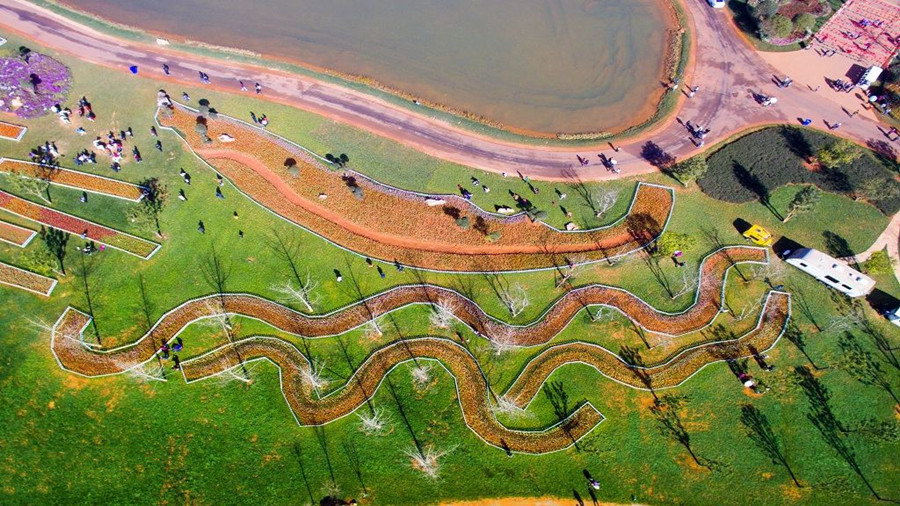
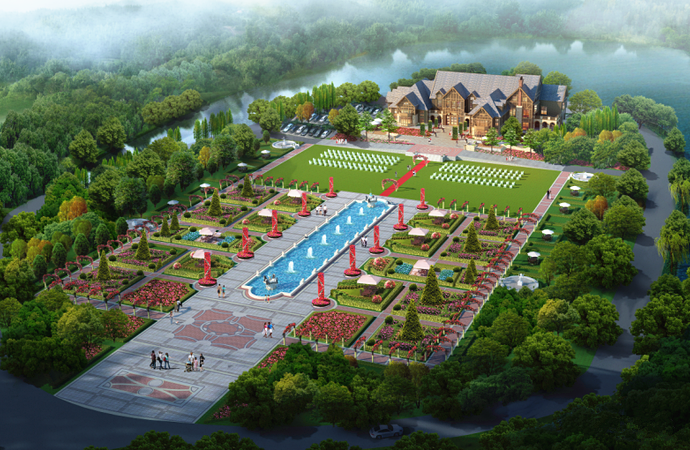
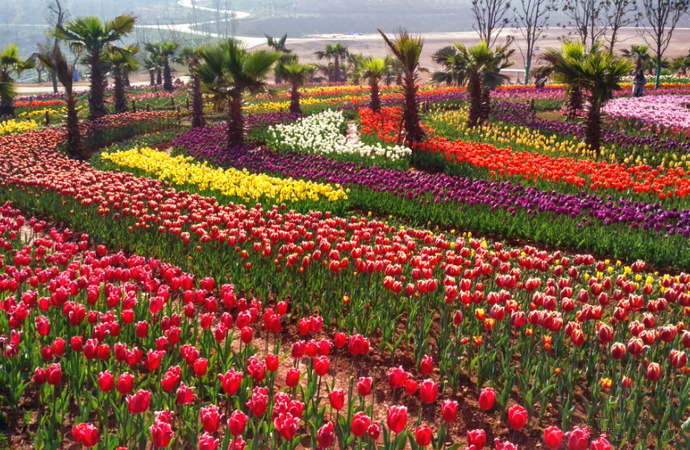
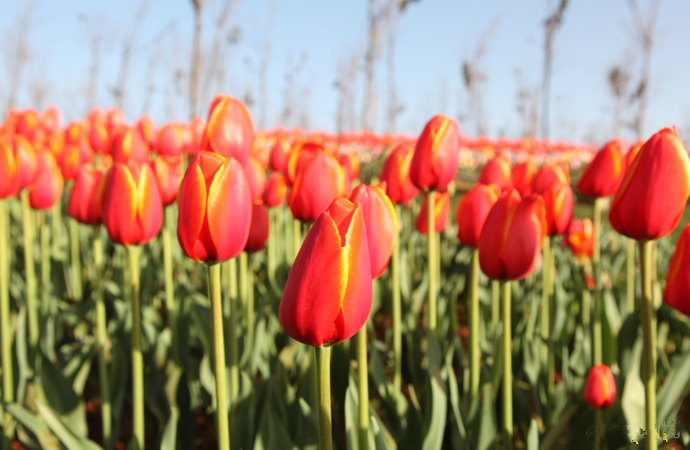
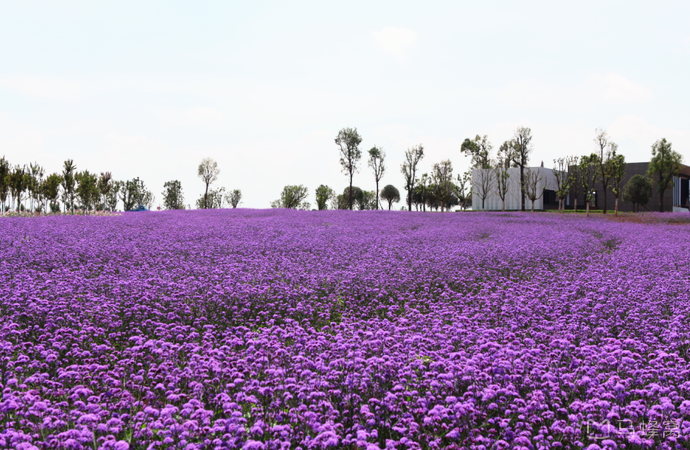
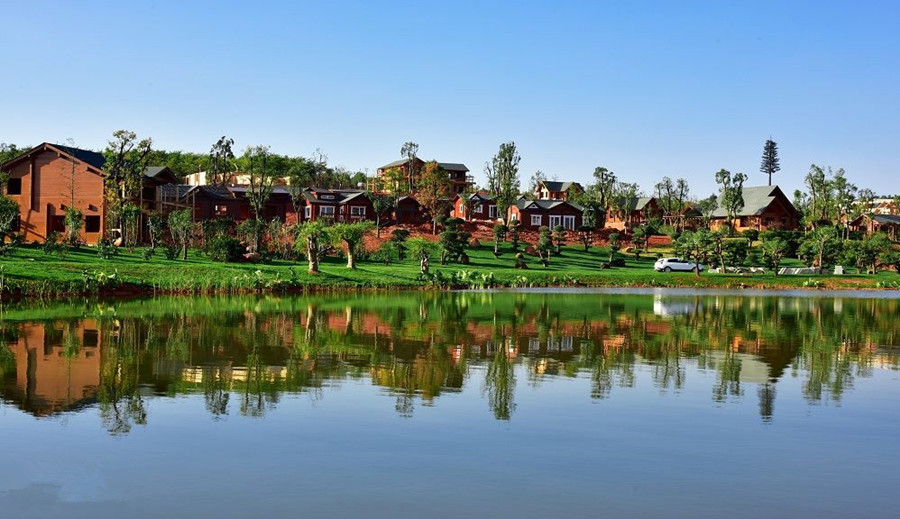
Location:
Overview
Alu Lake (阿庐湖) is a prominent scenic area located in the northern part of Luxi County (泸西县), Yunnan Province (云南省), about 8 kilometers from the county seat. Nestled at the edge of the economic zones of Kunming (昆明), Qujing (曲靖), and Gejiu (个旧), it serves as Kunming’s “back garden” and the “northern gate” of Honghe Prefecture (红河州). The lake is 175 kilometers from Kunming and is recognized for its reservoir-type landscape, which features stunning morning mists that create a serene atmosphere. The scenic area is adorned with picturesque vistas, including reflections of the surrounding mountains on the water, enhancing its natural beauty.
Natural Resources
The primary water sources for Luxi County originate from the north, specifically from the Qujing Mountains. The region is home to several significant reservoirs:
- Alu Lake (阿庐湖): Also known as Banqiao River Reservoir (板桥河水库), it is revered by locals as the “Mother Lake.”
- Awei Reservoir (阿味水库): Another important reservoir in the area.
- Baishuitang Reservoir (白水塘水库): A freshwater lake-type medium-sized hydropower project.
These reservoirs contribute to the local ecosystem, and the majority of the water flow travels from north to south, ultimately merging into the Nanpan River (南盘江). Within the county seat lies Yibang Pool (矣邦池), which is also a significant water feature.
Key Attractions
Banqiao River Reservoir (板桥河水库)
Banqiao River Reservoir, or Alu Lake, has a total storage capacity of 79.4 million cubic meters and a normal water storage capacity of 72.2 million cubic meters. It irrigates approximately 144,000 acres, constituting 65% of Luxi County’s essential farmland. The reservoir serves as a vital water source for over 260,000 residents, providing drinking water and supporting agricultural activities in the region.
Scenic Features
The area is rich in natural beauty and biodiversity, featuring:
- Feilong Ascending to Heaven (飞龙上天): A stunning rock formation.
- Yanshi Stone (砚瓦石): A unique geological feature.
- Magpie Hollow (喜鹊凹): A serene spot popular among birdwatchers.
- Green Shade Pond (绿荫塘): A tranquil pond surrounded by lush greenery.
- Thousand Acres Flower Sea (千亩花海): A vast area filled with colorful flowers, ideal for photography.
- Yangmei Mountain Forest Area (杨梅山森林区): A dense forest perfect for hiking.
- Crazy Cave (疯子洞) and Crane Island (仙鹤岛): Interesting geological formations and scenic spots.
- “Bamboo Family Village” Leisure Farm (竹家庄): A cultural site offering local agricultural experiences.
Cultural Significance
The name “Alu” is rooted in local legend, attributed to a heroic general of the Yi ethnic group who defended the western borders. He died in battle near Banqiao River, and to honor his sacrifice, the area was named after him, symbolizing bravery and resilience.
Climate Characteristics
Alu Lake features a subtropical highland monsoon climate, with:
- Average Annual Temperature: Ranges from 15°C to 22.6°C.
- Summer (Rainy Season): Characterized by heavy rainfall, predominantly influenced by southwestern monsoons.
- Winter (Dry Season): Marked by sunny days and cooler temperatures, with less rainfall.
- Temperature Variations: Noticeable temperature differences exist between seasons, with cool autumns often affected by cold fronts.
How to Get There
To reach Alu Lake Scenic Area:
- By Car: Drive from Kunming, which takes approximately 2-3 hours via highway.
- By Public Transport: Take a bus from Kunming to Luxi County, followed by a short taxi or local transport to the scenic area.
Travel Tips
- Best Time to Visit: Spring (March to May) and summer (June to August) are ideal for experiencing the vibrant flora and pleasant weather.
- Accommodation: Look for local guesthouses or hotels in Luxi County for a more authentic experience.
- Dining: Don’t miss local specialties, especially dishes made with Daqiao Fish (大桥鱼), known for its delicate flavor and nutritional benefits.
- Activities: Engage in boating, fishing, and hiking. Scenic walking trails along the lake offer breathtaking views and opportunities for birdwatching.
- Photography: Bring a camera to capture the stunning landscapes, especially at sunrise and sunset.
Experience the grandeur of Alu Lake and the rich history of the Silk Road in this enchanting human paradise, where nature and culture intertwine beautifully!
Overview
Nanhu Lake (南湖) is located in the southern part of Mengzi City (蒙自市), Honghe Hani and Yi Autonomous Prefecture (红河哈尼族彝族自治州), specifically in the southern region of Wenlan Town (文澜镇). The lake was formed from rainwater and was previously known as Caohai (草海) or Caobei (草陂). In the Ming Dynasty (明代), it was developed into a reservoir, with three hills named Penglai (蓬莱), Fangzhang (方丈), and Yingzhou Island (瀛洲岛) constructed in the lake, becoming a gathering place for scholars. It is also famously known as the origin of Yunnan’s (云南) renowned crossing-the-bridge rice noodles (过桥米线), making it a great destination for leisure.
Geographical Location
Nanhu Lake is located just outside the southern gate of Mengzi County (蒙自县), hence its name. The scenic area covers an area of 408,700 square meters, with a water area of 299,400 square meters and a storage capacity of 450,000 cubic meters. The lake’s clear waters and lush willows along the banks create a picturesque landscape, dotted with historical sites and recorded in the “Dictionary of Chinese Scenic Spots” (中国名胜词典).
Main Attractions
Originally known as Caohai, the lake was improved by Governor Qian Bang (钱邦) in the Ming Dynasty. He led the people to dredge out the muddy waters and constructed three small hills named after the mythical mountains of Penglai, Yingzhou, and Fangzhang. The lake area is approximately 300,000 square meters, with willow trees planted along the banks and three islands connected by pathways. Notable architecture includes the majestic Yingzhou Pavilion (瀛洲亭), a hexagonal three-tier structure adorned with glazed tiles and exquisite carvings, complemented by the soothing sounds of wind chimes. Various pavilions and unique flora abound, making it a perfect retreat for scholars.
The western scenic area is spacious and features state-level cultural heritage sites such as the Revolutionary Martyrs Memorial (革命烈士纪念碑) and the Memorial of Wen Yiduo (闻一多纪念碑). Additional attractions include the various gardens and sculptures scattered around the park.
Natural Landscape
- Lakes The lake serves as the core attraction, with its clear waters reflecting the lush surroundings. Visitors can stroll along the banks, enjoy scenic views, and engage in fishing.
- Garden Scenery The park features exquisite landscaping, including lawns, flowerbeds, rockeries, and fountains, allowing visitors to appreciate both natural and artistic beauty.
- Ecological Scenery The park’s diverse ecological landscape includes wetlands, forests, and grasslands, providing opportunities to observe various birds and insects in their natural habitat.
Cultural Heritage
- Historical Culture Nanhu Lake Park is rich in historical and cultural significance. It was once a gathering place for Qing Dynasty officials and literati, leaving behind many historical relics such as the Long Bridge (长堤) and the Heart-of-the-Lake Pavilion (湖心亭).
- Ethnic Culture The park is a melting pot of various ethnic cultures. Visitors can enjoy performances of ethnic dances, music, and traditional crafts, as well as participate in cultural festivals such as the Torch Festival (火把节) and Water Splashing Festival (泼水节).
Tourism Services
- Visitor Center The park has a visitor center offering information, ticketing services, and luggage storage.
- Dining Facilities Various dining options are available, including Chinese and Western restaurants and snack stalls, serving authentic Yunnan cuisine.
- Accommodation Facilities The park offers diverse accommodation options, including standard hotels, vacation villas, and camping sites.
- Amusement Facilities The park includes various recreational facilities such as boats, bumper cars, and merry-go-rounds suitable for visitors of all ages.
Nanhu Lake Park attracts countless visitors with its beautiful natural landscapes and rich cultural heritage. The park provides a perfect setting for relaxation and cultural exploration. Whether you’re looking to unwind, appreciate nature, or learn about history and ethnic cultures, Nanhu Lake Park is a must-visit destination.
How to Get There
Mengzi City is accessible by taxi, walking, or public transport. Various transportation options are available to reach different scenic spots.
Travel Tips
- Check the weather forecast and dress appropriately, ensuring proper sun protection.
- Don’t miss local delicacies like fire-roasted house chrysanthemum rice noodles and other regional specialties.
- Consider staying at nearby hotels, such as the Helen Garden Hotel (海伦花园酒店), for a comfortable experience.
- Capture the beautiful scenery with your camera; the park is full of picturesque views!
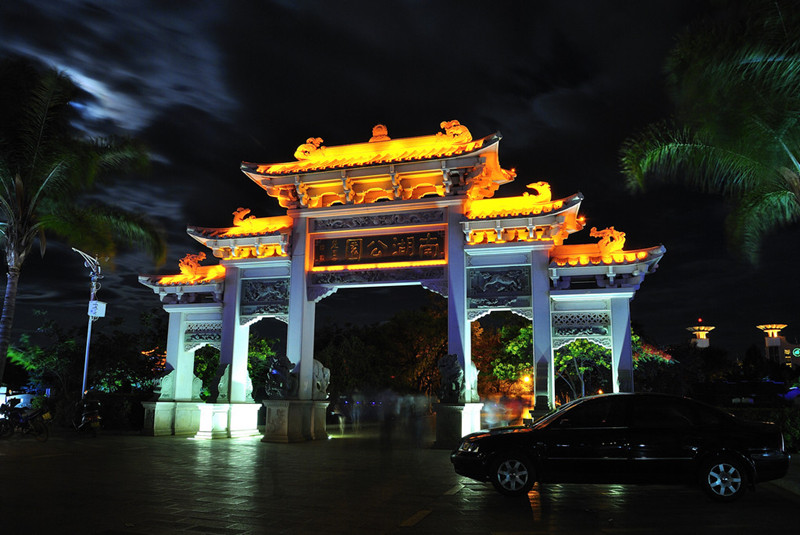
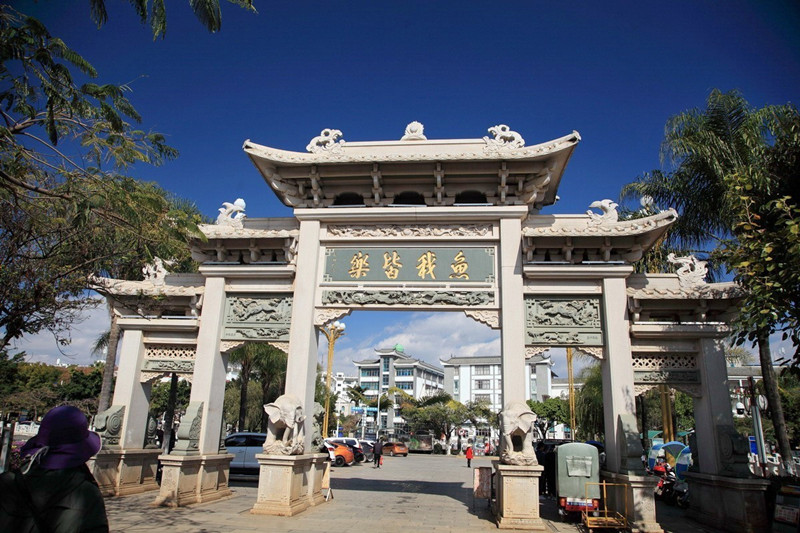
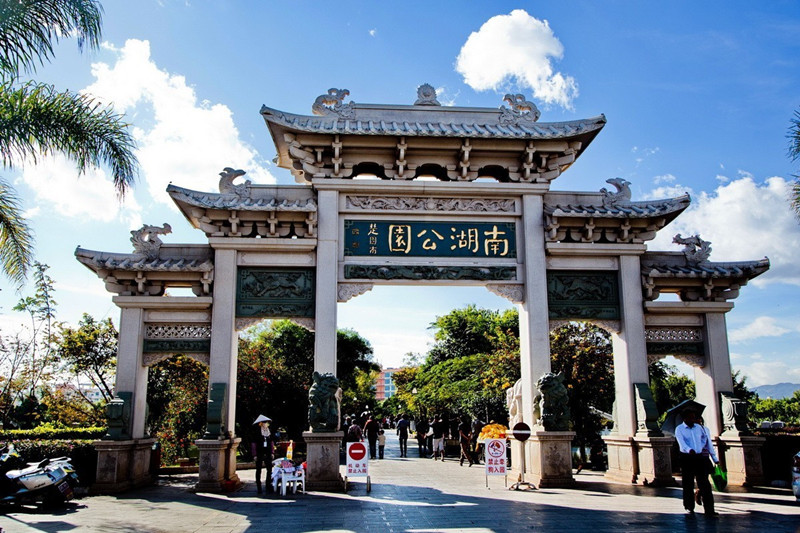
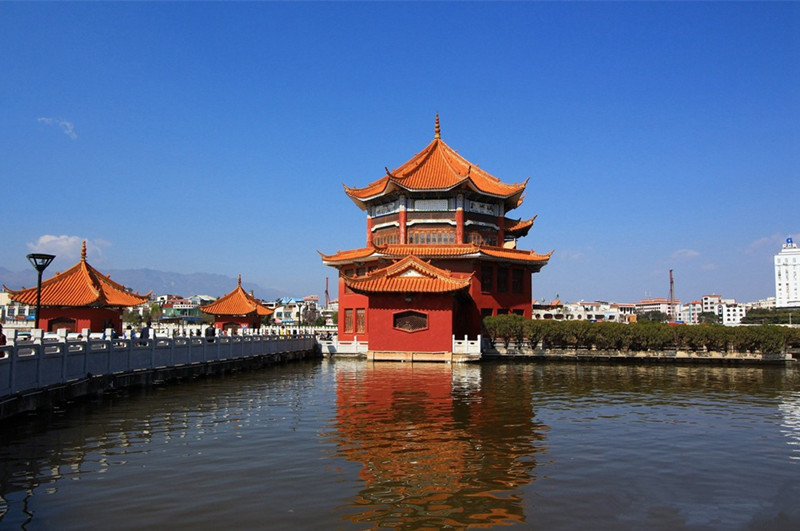
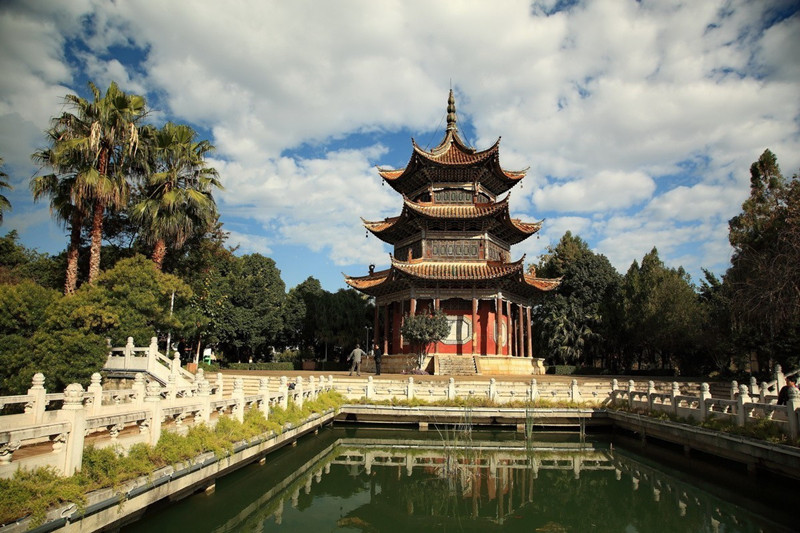
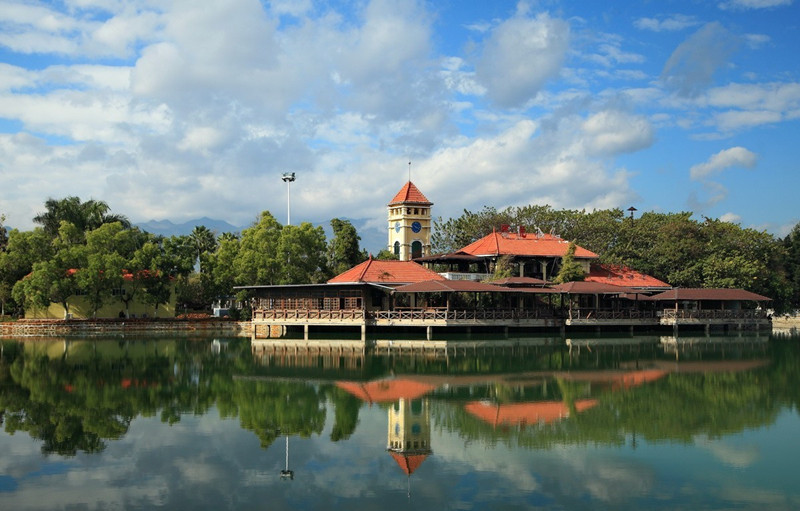
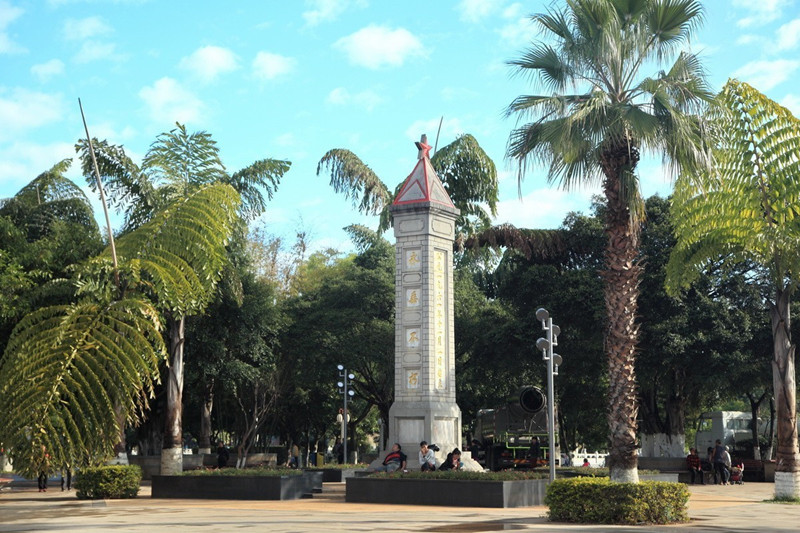
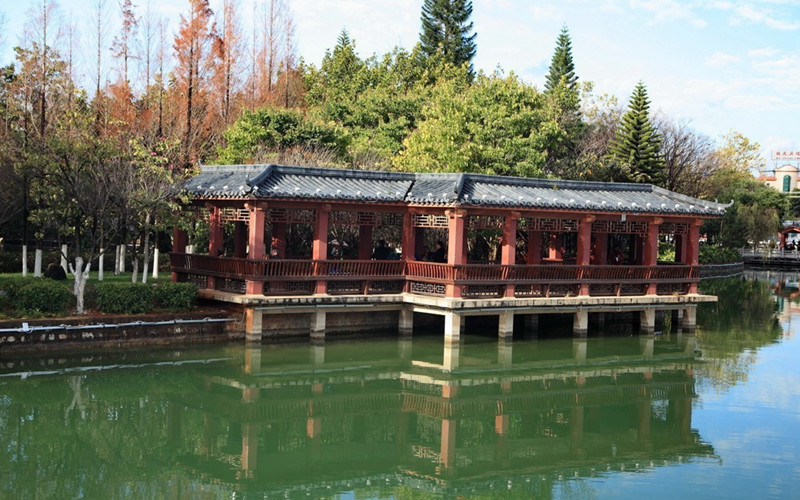
Location:
Overview
Shuashui Dragon Pool (耍水龙潭) is located at the foot of the mountains on the western side of Damaidi Village (大麦地村) in Xuanwei City (宣威市), Qujing (曲靖), Yunnan Province (云南省). Surrounded by bamboo and willow trees, the pool’s emerald green water remains tranquil. Every summer and autumn, a spectacular phenomenon occurs that resembles a dragon playing in the water, giving rise to its name.
Geographic Location
Shuashui Dragon Pool is situated on the western foothills of Damaidi Village, which is part of the Liangjiatian Village Committee (梁家田村委会) in the town of Jiu County (旧县镇). It is approximately 3 kilometers from the village committee and 12 kilometers from the town center. The area covers 1.75 square kilometers and sits at an altitude of 1,950 meters. The average annual temperature is 14.8°C, with annual rainfall measuring about 1,045 millimeters. This climate is suitable for growing various crops, including flue-cured tobacco (烤烟), corn (玉米), rice (水稻), potatoes (马铃薯), and vegetables.
Local Community
Damaidi Village consists of one village group with 48 households and a population of 160, all of whom are engaged in agriculture. The labor force numbers 101, with 89 individuals working in the primary industry. In 2006, the total economic income for the village was 550,600 CNY, with an average net income of 1,850 CNY per farmer, primarily generated from agriculture and animal husbandry.
How to Get There
To reach Shuashui Dragon Pool, you can drive or take a bus to Xuanwei City. From Xuanwei, head towards Jiu County and follow the signs to Damaidi Village, which is approximately a 20-minute drive from the city center.
Travel Tips
- Transportation: Public buses are available from Xuanwei to Jiu County, but renting a car may provide more flexibility.
- Best Time to Visit: The summer and autumn months are ideal for witnessing the pool’s unique dragon-like water phenomenon.
- Local Cuisine: Don’t miss the opportunity to taste local agricultural products and dishes prepared with fresh ingredients from the region.
- Accommodations: Various guesthouses and hotels are available in Xuanwei City for those wishing to extend their stay.
- Outdoor Activities: Enjoy hiking and exploring the beautiful natural surroundings, as the area offers scenic views and tranquil environments.
Introduction to the Scenic Spot
Baishuitang Pond (白水塘) is located in Sanchahe Town, Luliang County (陆良县), Qujing City (曲靖市), Yunnan Province (云南省). It is 15 kilometers from the county seat and is the largest and last lake remaining from the Luliang Basin.
This scenic area is situated about 150 kilometers east of Kunming (昆明), approximately 23 kilometers south of the Zhaokuai Station (召夸站) on the South Kun Railway, less than 60 kilometers from the Shilin Scenic Area (石林), and about 45 kilometers from the Jiu Xiang Scenic Area (九乡风景区).
Currently, the lotus area in the pond spans 6 square kilometers, surrounded by fertile farmland and convenient transportation. In summer, the lush lotus leaves and blooming flowers create a picturesque landscape. Visitors can row a small boat through the vast lotus fields, enjoying the scenic beauty of the lake and fields, described in poetry as: “Rowing amidst the lotus, fish and shrimp play by the boat; the blue waves connect with the sky, the scent of lotus seeds fills the air.” This serene retreat away from the hustle and bustle of city life offers opportunities for fishing, photography, and savoring locally caught fish alongside delicious stewed potatoes. A visit to Baishuitang is a must when in Luliang.
The air here is clean and fresh, making it a perfect spot for relaxation, especially with its proximity to other attractions such as the Cuanlongyan Monument (爨龙颜碑), the AAAA-rated Caise Shalin Scenic Area (彩色沙林), Dajue Temple (大觉寺), Niutou Mountain (牛头山), and the Ancient Great Wall (古长城).
Scenic Beauty of the Pond
Baishuitang Pond lies between the Nanpan River (南盘江) and the Dugong River (杜公河), stretching north to south and narrow east to west. The lake primarily receives water from rainfall, covering an area of 1.6 square kilometers with a depth of 2 meters. In summer, the pond is expansive with white waves, hence the name Baishuitang (白水塘). Surrounded by stone walls and roads, the pond sparkles like a jewel amidst thousands of acres of fertile land, rich in aquatic life such as wild ducks and various fish.
Visitors can fish directly from the pond, cooking their catch for a truly fresh and unique dining experience. During summer, the pond is filled with lotus flowers, creating a fragrant and colorful landscape. In winter, the clear waters reveal the bottom, often surrounded by morning mist that dances in the sunlight, creating a magical atmosphere.
The water pavilion resembles a waterside tower, adding to the scenic beauty of the area.
Poetic Scenery
The famous poet Yang Wanli (杨万里) wrote, “The lotus leaves reach the sky in endless green, the lotus flowers reflect the sun in a different red.” Although originally a farewell poem, it is often regarded as a picturesque description. The Baishuitang Pond in Tianbao Village (天宝寺村), Luliang County, seems to embody this sentiment perfectly.
In autumn, the fragrant rice fills the air, and a visit to the pond allows one to experience its tranquility and natural beauty. The emerald leaves and red flowers create a stunning visual display against the blue skies, with gentle breezes rippling the water’s surface.
The lotus plants at Baishuitang have become a symbol of local pride, and the surrounding landscape offers a refreshing escape from city life.
Scenic Features
At Baishuitang Pond, visitors can enjoy fishing, boating, and photography amidst the beautiful surroundings. The area has been preliminarily developed with 6.7 kilometers of waterways and 11 kilometers of lakeside paths. There are 26 fishing ponds and multiple “farm stay” spots offering local hospitality. With 100 boats and over 150 boatmen, Baishuitang can accommodate around 4,000 visitors daily, promising a quality experience.
Overall, visiting Baishuitang Pond provides an opportunity to escape urban noise and immerse oneself in nature’s beauty.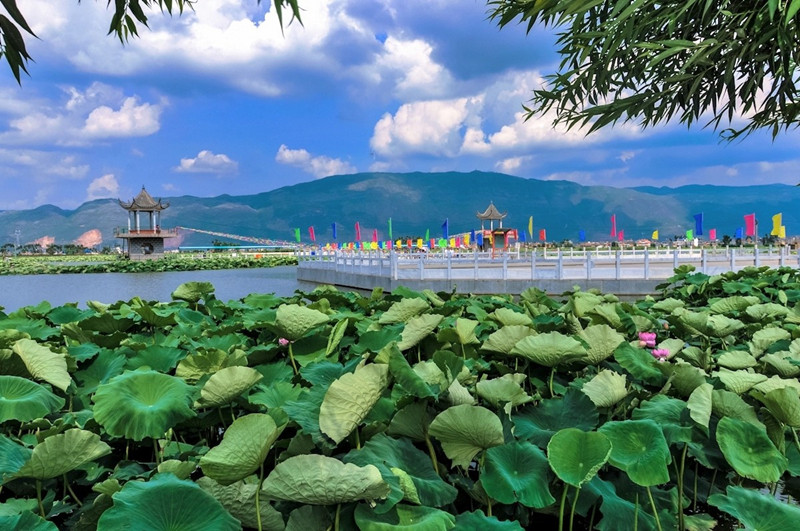
How to Get There
Baishuitang Pond is located about 8 kilometers south of Luliang County. You can choose to drive, which takes about 20 minutes with clear road signage. For those traveling by bus, you can take a direct bus from Kunming to Luliang at the Eastern Passenger Transport Station (东部客运站) or Dongju Passenger Transport Station (东菊客运站).
Travel Tips
- Transportation: To reach the scenic area, take bus route 144 from Qujing City (曲靖市) or hire a taxi for convenience.
- Shopping: Local specialties include long-haired rabbit products and honey pears.
- Accommodation: There are 23 star-rated hotels in Qujing, providing a comfortable stay for guests.
- Dining: 12 “farm stay” spots offer local meals, ensuring dining convenience.
- Best Time to Visit: Summer for the lotus blooms and autumn for the fragrant rice fields.
- Festivals: The best time to appreciate the lotuses is during their peak bloom.
Visiting Baishuitang Pond promises a unique experience filled with natural beauty and local culture.
Overview
Ruyi Dragon Pool (如意龙潭, Rúyì Lóngtán) is a scenic spot located in the Maijie Town (马街镇, Mǎjiē Zhèn) of Luliang County (陆良县, Lùliáng Xiàn), Qujing City (曲靖市, Qūjìng Shì), Yunnan Province (云南省, Yúnnán Shěng). It is situated on the eastern side of Wufeng Mountain (五峰山, Wǔfēng Shān), approximately two kilometers away from the mountain itself.
Historical Significance
Historically known as Lingyu Spring (灵雨泉, Língyǔ Quán), this pool earned its name due to its reputed ability to summon rain. It was later referred to as Lingyi Dragon Pool (灵益龙潭, Língyì Lóngtán), reflecting the benefits of the spring water to the local environment. The spring emerges forcefully from the rock, resembling pearls cascading like jade, and the springhead is encircled by a hexagonal stone enclosure. At the edge of the pool grows a rare tree species known as the Buddha Tree (佛树, Fó Shù), also called the Dragon Tree (龙树, Lóng Shù). This tree, which is hundreds of years old, has a trunk covered in scales that extend from the roots to each of its branches, creating a remarkable sight as it sprawls over the pool.
Cultural Heritage
During the reign of the Qianlong Emperor (乾隆皇帝, Qiánlóng Huángdì) in the Qing Dynasty (清朝, Qīng Cháo), a temple was built at Ruyi Pool to honor the Ruyi Goddess (如意神女, Rúyì Shénnǚ). Pilgrims have been coming here year-round to pay their respects, seeking favorable weather and peace for the country and its people. According to legend, after the temple was established to ward off evil spirits, the mischief-making dragon no longer dared to appear, resulting in a significant decrease in catastrophic hailstorms in the area.
The perpetual flow of Ruyi Pool’s spring water is attributed to the community’s conscious efforts to protect the surrounding forest, supplemented by reforestation initiatives. The forest features a species known as the Longevity Tree (寿星树, Shòuxīng Shù), which grows over 20 meters tall with a diameter exceeding one meter. These trees provide a canopy of greenery, creating a soothing ambiance complemented by the sounds of birds, cicadas, wind, and flowing water—a gentle “Ruyi” symphony that is truly delightful. The scenery is aptly described by the lines: “The bright moon shines between the pines, and clear springs flow over the stones.”
Seasonal Activities
In spring, visitors flock to Ruyi Pool for picnics and outings, surrounded by blooming peach and pear trees, while fields turn a fresh green, enhancing the festive atmosphere. During the hot summer months, people seek refuge from the heat at the pool, enjoying the cool water and gentle breezes. In autumn, the crisp air and bright moon invite leisurely games of chess and wine tasting at the stone tables by the pool, fostering a sense of tranquility and peace. Winter transforms Ruyi Pool into a mystical realm, with steam rising from the water and a misty ambiance enveloping the area, making it difficult to discern between the earthly and the ethereal.
How to Get There (Transportation)
To reach Ruyi Dragon Pool in Luliang County, you can take a bus from Qujing City to Luliang County. Upon arriving in Luliang, local taxis or shared rides can transport you to Maijie Town. If you prefer to drive, follow the main roads leading to Luliang, and look for signage directing you to Wufeng Mountain and Ruyi Dragon Pool.
Travel Tips for Ruyi Dragon Pool
- Best Time to Visit: The ideal seasons to visit are spring and autumn when the weather is pleasant and the scenery is beautiful.
- Photography: Bring a camera to capture the stunning landscapes, especially the unique Buddha Tree and the tranquil pool.
- Pack Essentials: Ensure you bring water, snacks, and a picnic blanket if you plan to enjoy a meal by the pool.
- Local Cuisine: Take the opportunity to try local delicacies in Maijie Town during your visit.
- Respect Nature: Help preserve the natural beauty by staying on marked paths and not disturbing the local wildlife.
Overview
Huashan Lake (Huāshān Hú, 花山湖) is located in the northeastern city of Qujing (Qūjìng, 曲靖), Yunnan Province (Yúnnán Shěng, 云南省). It can be reached by following the river from the source of the Pearl River (Zhūjiāng, 珠江), passing through Guanyin Mountain (Guānyīn Shān, 观音山), leading to this stunning lake. Huashan Lake is a dazzling pearl set amidst the source of the Pearl River, embodying the grace and elegance of classical Eastern aesthetics. Surrounded by serene landscapes, it reveals a sense of composure and beauty.
Scenic Features
Huashan Lake is situated in the Karst (Kā sī tè, 喀斯特) landform area of Huashan in Zhanyi (Zhān yì, 沾益). The lake stretches approximately four kilometers in length and is over one kilometer wide. The best way to explore Huashan Lake is by taking a boat ride straight to the heart of the lake. As you glide across the shimmering waters under the warm sun, you will enter a fantastical world where the lake alternates between wide expanses and narrow stretches, displaying hues of blue and white.
During your journey, you will encounter a remarkable sight known as the “Small Stone Forest” (Xiǎo Shílín, 小石林)—a small island characterized by an array of bizarre rock formations resembling towering trees. Each stone stands thickly clustered together, forming a unique natural jungle. Observing closely, these formations take on various animal shapes: some look like lions, others resemble deer, horses, and sheep, while some even evoke the image of lotus flowers blossoming in the water.
Continuing from the Small Stone Forest, you will find Fenghuang Mountain (Fènghuáng Shān, 凤凰山). Originally two connected hills, when the lake rises, they transform into two unconnected islands, reminiscent of two playful phoenixes splashing in the water.
Scenic Description
The landscape surrounding Huashan Lake is exceptionally beautiful, with broad, rippling waters framed by mountains, islands, and clusters of curious rocks. Mr. Jiang Jicheng (蒋吉成), a renowned writer from Yunnan, expressed his admiration for the scenery in his book “Colorful Yunnan” (《彩云南现》): as one ascends the stone paths into the mountains, the dense forest exudes a relaxed beauty, with sunlight filtering through the leaves, creating a glittering effect on the lake’s surface.
Historical Context
To thoroughly understand how the hardworking and brave people of Zhanyi constructed Huashan Lake in this Karst region, I spent several months visiting villages in the area, talking to participants, water conservancy officials, and local leaders. It was a challenging endeavor, often requiring additional visits to gather precise information. Local residents were warm and supportive, providing crucial insights into the construction of the dam, the challenges of the clay and silt, and the technical measures taken to manage the springs.
Through their dedicated labor and innovative practices, the people of Zhanyi successfully harnessed the formidable Karst landscape, overcoming significant challenges and creating a miracle at the source of the Pearl River. This remarkable history is chronicled in the book “Nampan River Today and Yesterday” (《南盘江今昔》). The spirit of determination and resilience echoes in the local songs celebrating their achievements.
Today, Huashan Lake has become a famous tourist destination. The area is thriving with agriculture, and the beauty of the lake continues to attract visitors year-round.
Activities
Visiting Huashan Lake offers a myriad of activities, including:
- Boat Tours: The ideal way to experience the serene beauty of the lake.
- Nature Observation: Explore the unique rock formations and diverse wildlife around the lake.
- Photography: Capture the picturesque landscapes, especially at sunrise or sunset.
How to Get There
Huashan Lake is approximately 1 kilometer from the intersection of the Xuantian Gao Registration Road (宣天高登记公路) and Bole Township (播乐乡) in Zhanyi District, Qujing City, Yunnan Province.
Travel Tips
- Best Time to Visit: Spring and autumn offer mild weather, perfect for outdoor activities.
- What to Bring:
- Comfortable shoes for walking.
- Sun protection (hat, sunscreen).
- A camera to capture the stunning scenery.
- Facilities: Restrooms and dining options may be limited, so plan accordingly.
Visit Huashan Lake for an unforgettable experience of natural beauty and tranquility in Yunnan! ?
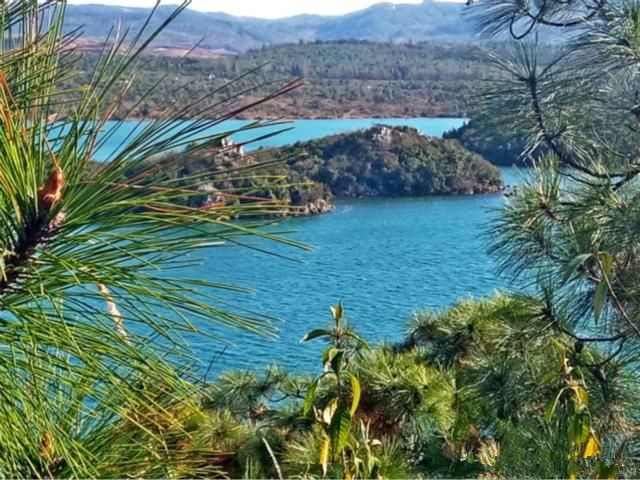
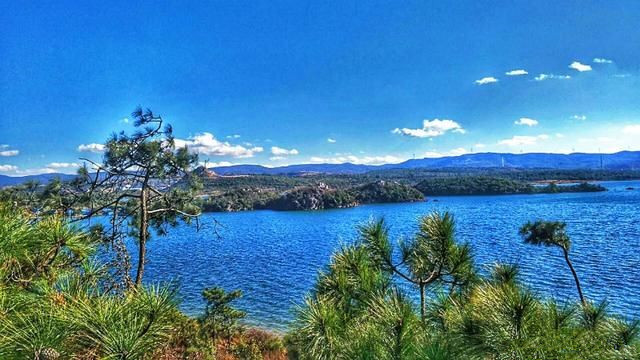
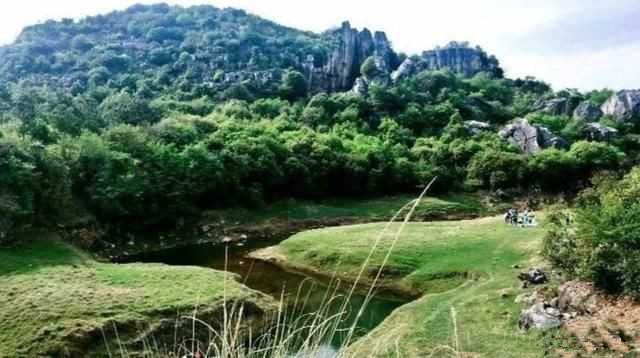
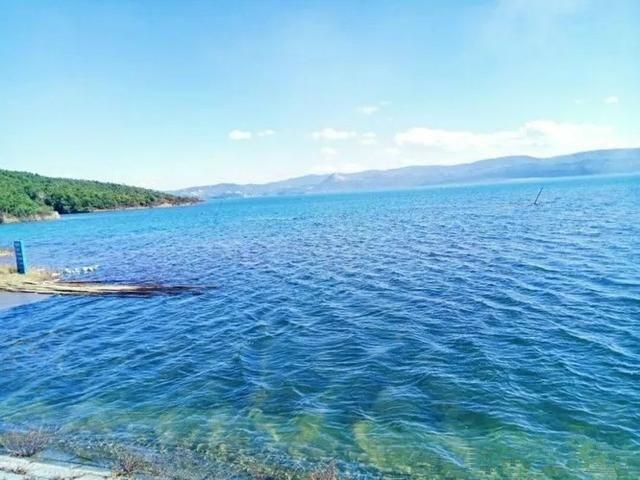
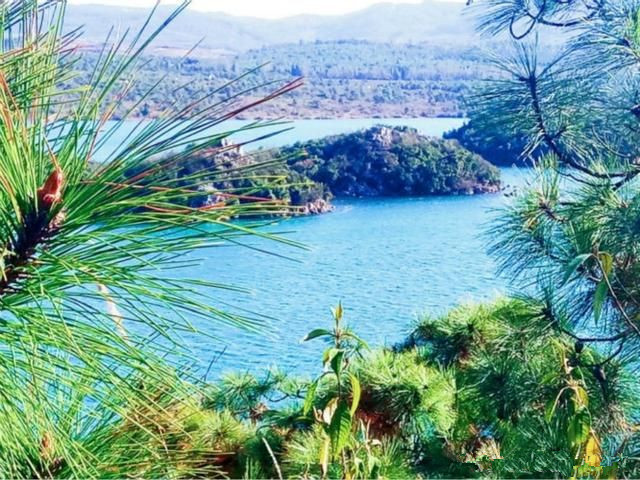
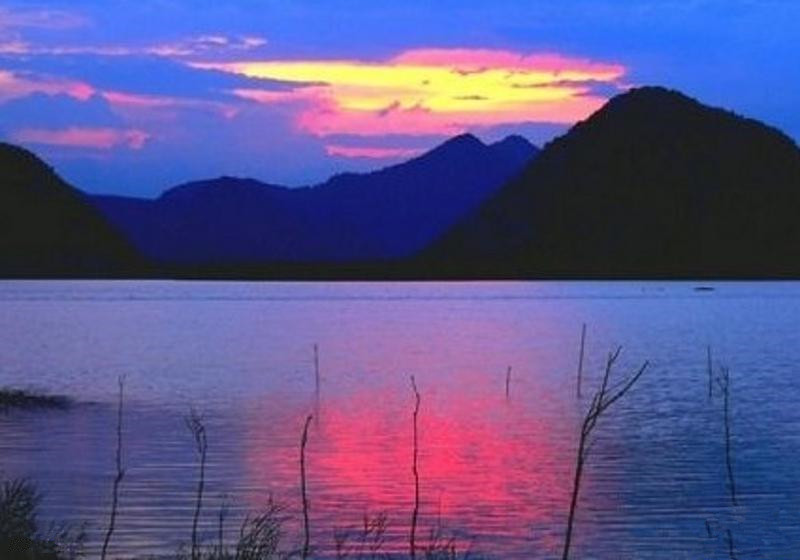
Taiyehu Lake Park (太液湖公园) is located in the center of Luoping County (罗平县), Qujing (曲靖市). It is the site of one of Luoping’s famous historical sights, “Taiye Chengbo” (太液澄波). The park is divided into four main sections: the main entrance square, Lushan Fairy Square (腊山仙子广场), the island in the lake, and a children’s playground.
Park Design and Features
The entire park is designed according to landscape aesthetics, incorporating modern architectural styles, creating a strong contemporary ambiance. The unique shapes within the park, combined with distinct landscaping art, make it an ideal place for leisure and entertainment.
One of Luoping’s Ten Ancient Sights
“Taiye Chengbo” is considered a cherished location in Luoping, often described as a “white moonlight” in the hearts of its people. After exploring the scenic spots and enjoying the diverse ethnic customs, visiting Taiyehu Lake Park allows you to experience a different charm of Luoping.
Historical Significance
Taiyehu Lake Park occupies about 120 acres, located next to the main thoroughfare, Jiulong Avenue (九龙大道), in Luoping County. During the Ming and Qing Dynasties, locals planted willows and pines along the lake’s shores, raised fish and shrimp in the waters, and cultivated lotus flowers, creating a picturesque scene that attracted many poets and scholars. They expressed their feelings through poetry, enriching the cultural heritage of this ancient landscape.
For example, Qing Dynasty scholar Yang Chunlin wrote: “The lake water is clear, reflecting the blue sky,
Lashan’s (腊山) shadow mirrored in the serene waves.”
The park houses eighteen stone tablets that record significant events and the brief history of Luoping, preserving the stories that have unfolded in this area and conveying a sense of historical weight.
Park Attractions
The park consists of ten main sections:
- Main Entrance Square
- Lake Heart Pavilion (湖心阁)
- Lotus Garden Corridor (荷苑走廊)
- Health Trail (健康步道)
- Scenic Walkways (景观栈桥)
- Nine-Hole Bridge (九孔桥)
- Lushan Fairy (腊山仙子)
- Green Spaces (绿化)
- Musical Fountain (音乐喷泉)
- Night Lighting (夜景灯光)
In the early morning, Taiyehu Lake is a great place for exercise, with groups practicing Tai Chi and aerobics. By noon, the lake offers a tranquil scene with clear waters reflecting the sky, making it a pleasure to stroll along the shore. On weekend evenings, the park attracts crowds who gather to watch the fountains dance to the rhythm of music.
In the northwest corner, Lushan Academy (腊山书院) serves as a stage where traditional music performances are held weekly, drawing audiences to enjoy the shows. The western area has been expanded to feature an outdoor stage, while the southwestern corner retains the Lushan Fairy Square, complete with small sculptures of young monks practicing martial arts, which children love to interact with.
Although Taiyehu Lake Park is not very large, it encompasses the elements of traditional Chinese garden architecture, including pavilions, bridges, flowing water, and flower gardens, making it a compact yet exquisite site.
Travel Tips
When visiting, please remember to wear masks and take personal protective measures to avoid crowding.
Historical Background
Taiyehu Lake was initiated in the 15th year of the Wanli Era (1587) by Huang Yu (黄宇), the governor of Luoping. Originally, it was built to prevent fires and improve irrigation. Over the centuries, the lake has undergone several reconstructions. Today, the park features a diverse range of trees, flowers, and recreational facilities, providing a harmonious natural setting that emphasizes green, ecological, and livable urban culture—making it a perfect spot for leisure and free to the public.
Getting There
The park is located at 373 Longmen Street (龙门街), Luoxiong Street (罗雄街道), Luoping County, Qujing City, Yunnan Province (云南省曲靖市罗平县罗雄街道龙门街373号), directly opposite the Luoping People’s Hospital (罗平县人民医院).
Time Required for Visit
Plan to spend about 1-3 hours exploring the park.
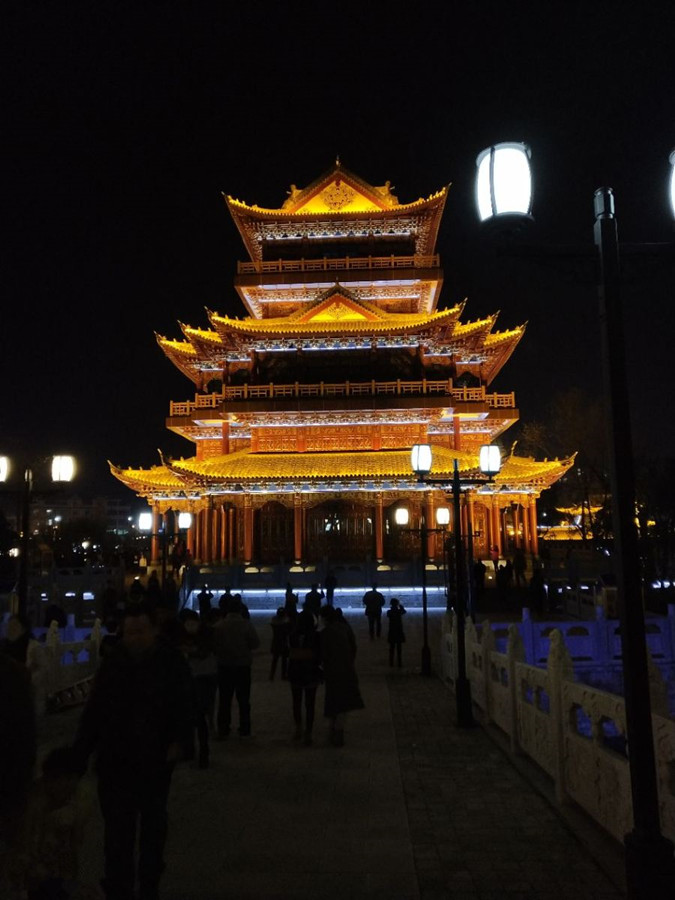
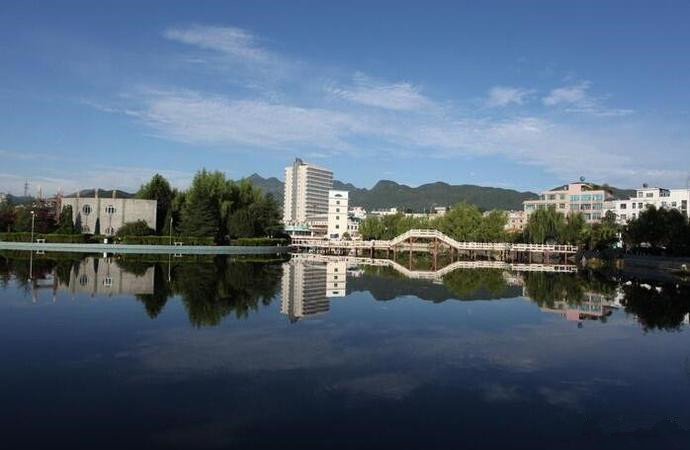
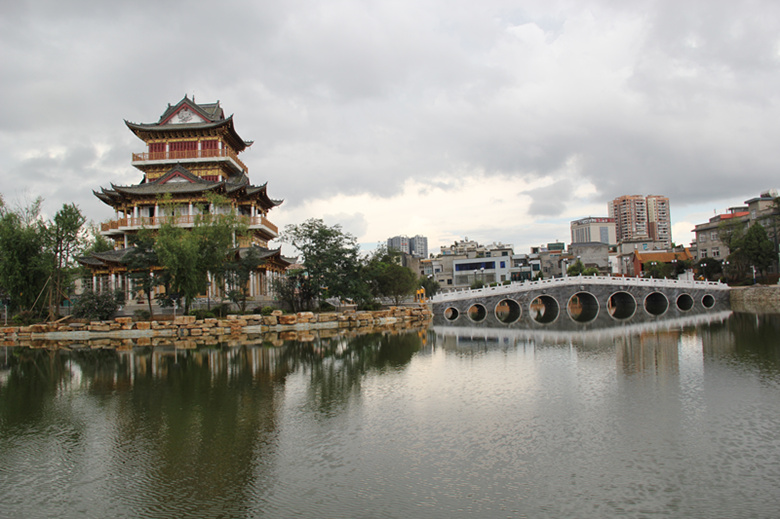
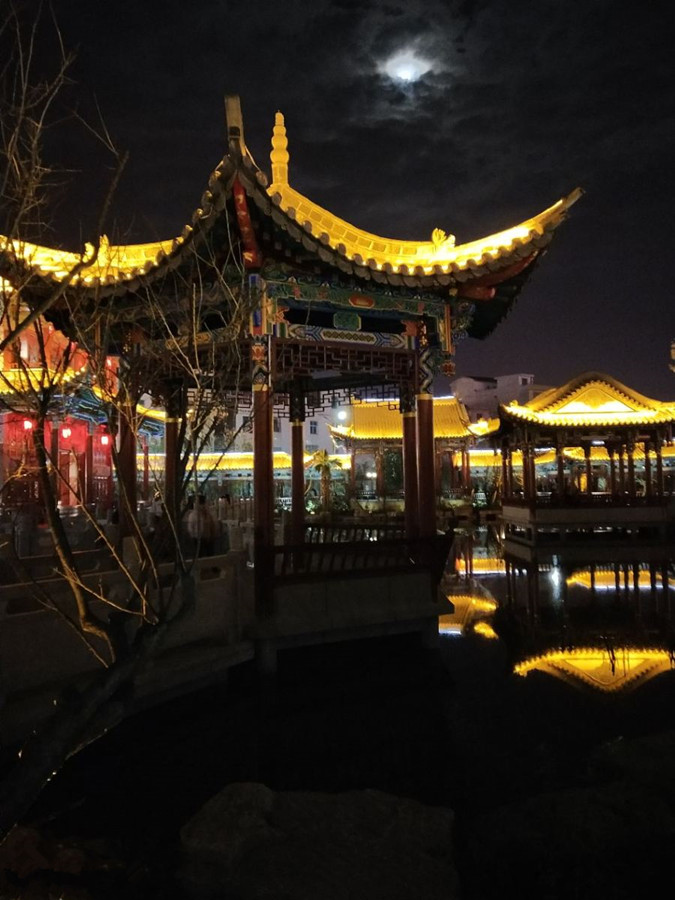
Overview
Gandi Yibi Lake, located in Fugong County (福贡县), Nujiang (怒江) Prefecture, Yunnan (云南), is one of the undeveloped soft erosion lakes of the Mingjing Snow Mountain Range (明静雪山系). Situated approximately 40 kilometers east of the town of Shangpa (上帕镇), the lake boasts a clear northern shore and lies to the west of the Biluo Snow Mountain Range (碧罗雪山山脉). With an elevation of 3,490 meters, the lake covers an area of 52,500 square meters and has an average depth of 6 meters.
Scenic Beauty
During the summer months, the weather can be unpredictable; even a single shout can summon fierce storms. This mysterious alpine climate phenomenon, combined with the lake’s picturesque scenery that surpasses even the most enchanting landscapes, allows visitors to forget their worries and fatigue. It feels as if one melts into a mystical world, leading to its reputation as the “Charming Lake.”
Key Details
- Chinese Name: 干地衣比湖 (Gandi Yibi Lake)
- Location: 东 (East of Shangpa Town, Fugong County)
- Area: 52,500 m²
- Elevation: 3,490 m
How to Get There
To reach Gandi Yibi Lake, visitors typically start from Fugong County. The lake is approximately a 40-kilometer drive from the county center, which can be done by hiring a local vehicle or joining a tour group. Ensure to check the local weather conditions before traveling, as the high-altitude environment can affect accessibility.
Travel Tips
- Acclimatization: Due to the high altitude, allow time to acclimatize to prevent altitude sickness.
- Weather Preparedness: The weather can change rapidly; bring waterproof clothing and gear.
- Photography: The stunning landscapes are perfect for photography—bring your camera!
- Respect Nature: Follow local guidelines to preserve the beauty of the area.
- Local Cuisine: Don’t miss trying the local delicacies available in Fugong County.
Visiting Gandi Yibi Lake promises a serene experience in a breathtaking environment, perfect for those seeking adventure and natural beauty.
Overview
The Nujiang Grand Canyon (怒江大峡谷) is located in the northwest of Yunnan Province (云南省), nestled between Gaoligong Mountain (高黎贡山) and Biluo Snow Mountain (碧罗雪山). It forms the core of the “Three Parallel Rivers” (三江并流) UNESCO World Heritage Site. Due to economic and social development constraints, many stunning scenic spots hidden within the Nujiang Grand Canyon remain unknown to the world. Among these is the Dayu Alpine Lake Cluster (达友高山湖泊群) in Shapa Town (上帕镇), Fugong County (福贡县), which is part of the Lao Woshan (老窝山) area, one of the eight major zones of the “Three Parallel Rivers.” Below, I recommend the beautiful scenery of Dayu Alpine Lake based on my experience participating in the Dayu Alpine Lake event during the Dragon Boat Festival in 2015.
In Fugong County, Gaoligong Mountain and Biluo Snow Mountain are home to numerous alpine lakes formed by the melting snow. Among them, the most beautiful is Dapuluo’s Alpine Lake (达朴洛的高山湖).
Dapuluo Alpine Lake
Locally known as “Sireyi Bi” (思热衣比), Dapuluo Alpine Lake is situated between the peaks of Biluo Snow Mountain at an altitude of 3,200 meters. The lake features crystal-clear waters and sweet-tasting water. Surrounding the lake are rare trees such as spruce and fir, which grow tall and elegant. The shimmering lake reflects the snowy peaks, creating a mesmerizing scene. In spring, the wildflowers bloom along the shores, and rhododendrons (杜鹃) burst into color, making it an ideal spot for tourism, exploration, and summer relaxation.
Scenic Features
The towering mountains of Gaoligong and Biluo are filled with a multitude of glacial lakes that are beautiful and mysterious. The natural ecology remains pristine, with forests of arrow bamboo (箭竹) and wild rhododendrons covering the slopes. In May and June, the mountains are adorned with vibrant flowers, making it a prime destination for adventure tourism. Notable lakes include Zhaliyi Lubi Lake (扎利依泸比湖), Muge Lake (木格湖), and Enreyibi Lake (恩热依比湖).
Biluo Snow Mountain Scenic Area
Biluo Snow Mountain is home to countless alpine lakes and primitive forest landscapes, serving as both natural reservoirs and tourist attractions.
The heart of Biluo Snow Mountain contains numerous high-altitude ice lakes, most of which are situated above 3,500 meters, with the highest nearing 4,000 meters, making them seldom visited. As spring transitions into summer, temperatures rise, melting the snow and revealing a stunning sea of flowers. The clear lake waters reflect the vast, untouched forests and open blue skies. A distinctive feature is the alpine rhododendrons, which grow densely and bloom even while remnants of snow cling to their branches, creating a fiery spectacle.
The best time for mountain climbing is between April and October, when locals harvest medicinal herbs, gather orchids, and fish for snow trout. The mountains are rich in precious medicinal materials such as cordyceps (虫草), fritillaria (贝母), ganoderma (灵芝), cicada flowers (蝉花), and yellow lotus (黄莲). This season is also a prime habitat for wildlife, which gathers here in droves during spring to feed, drink, and reproduce.
While there is no exact count of the numerous alpine lakes, locals will tell you that there are many yet to be discovered and named. Some of the larger lakes include Lao Woshan Sacred Lake (老窝山圣湖), Xixin Lake (洗心湖), Rhododendron Lake (杜鹃湖), Red Maple Lake (红枫湖), Xitian Lake (洗天湖), Yushui Lake (玉水湖), and Honghua Lake (红花湖). Due to the rugged terrain, few have traversed these areas, leaving many lakes still unnamed.
Additional Lakes in Fugong
In Fugong County, the Gaoligong Mountain and Biluo Snow Mountain areas feature dozens of alpine lakes formed from melting snow. Among these, Dapuluo Alpine Lake is considered the most beautiful.
Glacial Lakes
The glacial lakes are a result of Quaternary glacial activity over two million years ago, situated at an altitude of 1,980 meters. Shaped like a crescent, it is one of the world’s renowned alpine lakes and was listed as a key national scenic spot in 1982.
Lawuya Waterfall
Lawu (腊乌) is a name derived from the Nu (怒) ethnic group, named after the first cultivators in the area. Lawuya Waterfall is one of the impressive waterfalls in Fugong County.
Qilian Lake
Qilian Lake (七莲湖), located above 3,500 meters on both sides of the Nujiang River, is also known as “Charming Lake.”
Travel Itinerary
On June 20, a group of 22 like-minded hikers gathered at the Aduo Diqiao field in Dayu Village (达友村).
- 8:25 AM: Group gathering
- 8:45 AM: Entrance to Dayu Village Water Ditch, total length of 4.58 kilometers
- 9:00 AM: Scenic views along the water ditch
- 9:32 AM: Rest after completing the water ditch
- 10:15 AM: Trekking through the primitive forest
- 1:37 PM: Climbing over the pass in the rain, onto a flat road
- 3:57 PM: Arrival at Gandi Yibi (干地依比), the first lake, at an altitude of 3,580 meters
- 4:19 PM: Camping area reached; dinner preparation begins
- 8:30 PM: Dragon Boat Festival bonfire party by the lake
On June 21:
- 7:40 AM: Breakfast, then onward to the second and third lakes
- 9:15 AM: Arrival at Enreyibi Lake (恩热依比湖), the second lake, at an altitude of 3,780 meters, surrounded by rhododendrons
- 10:20 AM: Biluo Snow Mountain Pass (碧罗雪山丫口) at 4,228 meters, where villagers from Weixi (维西) were encountered
Getting There
To reach the Dapuluo Alpine Lake Cluster in Fugong County, you can take a bus or drive from Liuku City (六库) to Dayu Village (达友村), which is approximately a 40-minute journey. The route to the alpine lakes follows the ancient Salt Horse Road (盐马古道), leading to Lanping County (兰坪县) and Weixi County (维西县).
Travel Tips
- Altitude Awareness: Be prepared for high altitudes and take time to acclimatize to avoid altitude sickness.
- Best Time to Visit: The optimal time for visits is from April to October when the weather is milder.
- Proper Gear: Wear sturdy hiking shoes and bring layers to accommodate varying temperatures, especially in the mountains.
- Local Etiquette: Respect local customs, especially when interacting with the Nu and Lisu communities.
- Leave No Trace: Follow environmental guidelines to preserve the area’s natural beauty.
- Guided Tours: Consider joining a guided tour for deeper insights into the region’s culture and ecology.
Visiting the alpine lakes in the Biluo Snow Mountain area offers a unique blend of stunning natural scenery and rich cultural experiences, making it a must-see destination.
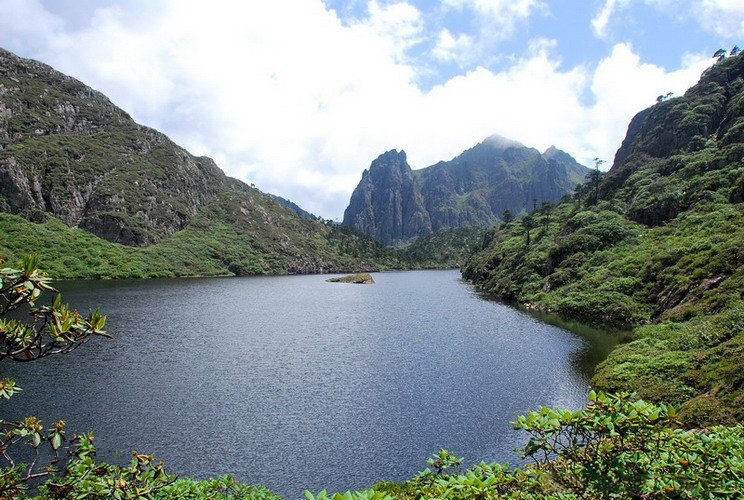
Overview
Qilian Lake (Seven Lotus Lakes), Fugong County, Nujiang
I. Geography and Ecology: Natural Wonders Above the Clouds
II. Culture and Legends: The Spiritual Homeland of the Nu People
III. Hiking and Exploration: A Journey of Challenge and Poetry
1. Route Planning
2. Best Travel Seasons
3. Gear and Tips
IV. Nearby Attractions: The Diverse Charms of the Nujiang Gorge
1. Laomudeng Village
2. Zhiziluo: The “Memory City”
3. Stone Moon
V. Transportation and Accommodation: Connecting the Hidden Realm to the World
1. Transportation
2. Accommodation
VI. Ecological Protection and Sustainable Travel
Conclusion
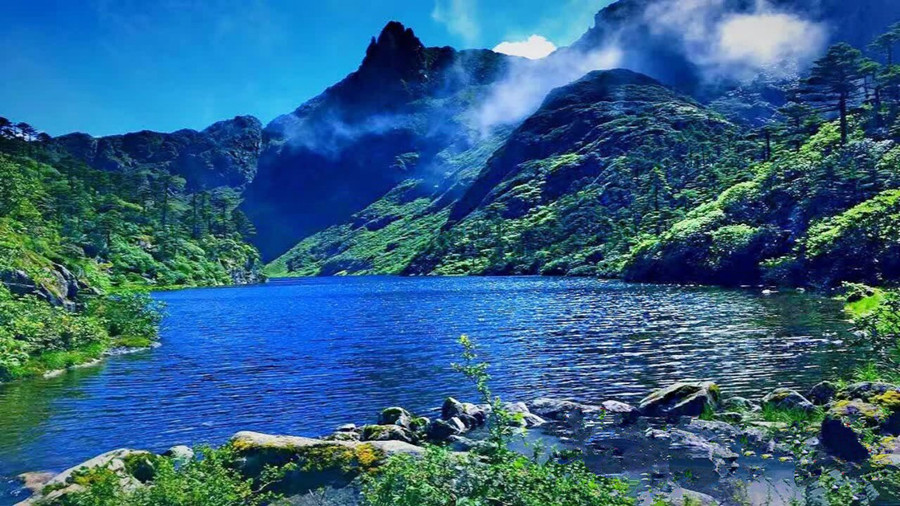
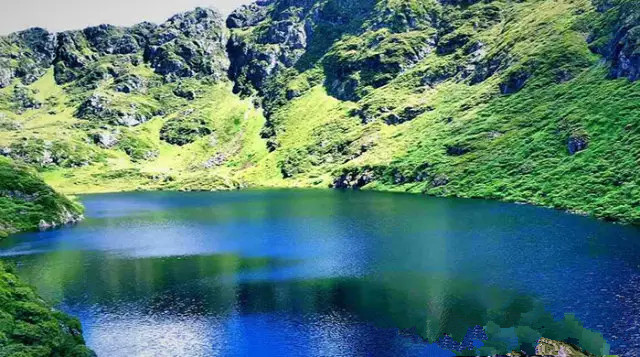
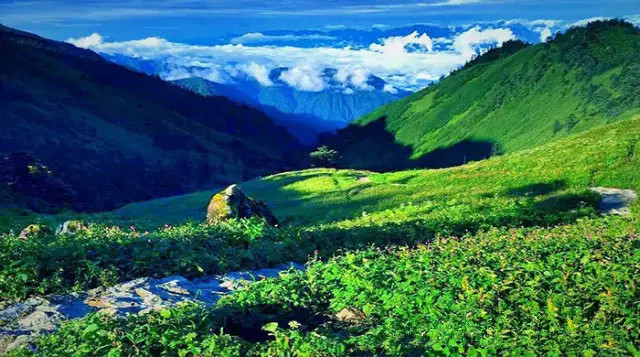
Overview
Xiaozhongdian (小中甸) Town is located 37 kilometers from the state capital of Diqing (迪庆), in a high-altitude plateau area. It is intersected by National Road 214 (国道214线), the Lijiang-Shangri-La Expressway (香丽高速), and the Lixiang Railway (丽香铁路), making it an important node on the Yunnan (云南) tourism circuit. Known for its natural resources and advantageous location, Xiaozhongdian is often referred to as the “Front Garden of Shangri-La,” “Tibetan Bathing Water Town,” and “Sea of Flowers on the Plateau.” As a vital route from Lijiang (丽江) to Shangri-La, Xiaozhongdian is also called the “Southern Gate” of Shangri-La. The opening of the Lixiang Railway has brought a significant influx of visitors, and attractions like Abuji (阿布吉), Bigu Heavenly Pool (碧沽天池), and Qianhu Mountain (千湖山) are preparing to welcome travelers in new ways.
Moon Lake (月亮湖)
Moon Lake is located in Tuanjie Village (团结村) of Xiaozhongdian Town. Driving from Shangri-La City (香格里拉市) to Moon Lake takes approximately 50 minutes. This enchanting lake is naturally shaped like a crescent moon, with a surface that mirrors the surrounding white pagodas and mountains. In the center of the lake, a circle of lush aquatic plants adds a touch of mystery.
Historical Significance
The Red Army (红军) once passed by Moon Lake during the Long March (长征). Today, the lake serves as the starting point for a Red-themed hiking route.
Travel Itinerary
Day Highlights:
- Dukezong Ancient Town (独克宗古城)
- Address: Kangzhu Avenue (康珠大道), Shangri-La City, Diqing.
- Entry: Free
- Activities: Visit the Giant Buddha Temple (大佛寺), which is built into the mountains. Don’t miss the breathtaking sunrise over the golden-topped temple. The Turtle Mountain Park (龟山公园) features the world’s largest prayer wheel, which requires eight adult men to turn it! In the evening, Sifang Street (四方街) comes alive with local Tibetan dances.
- Xiaozhongdian Reservoir (小中甸水库)
- Drive time: About 1 hour from Dukezong Ancient Town.
- Activities: Enjoy a picnic with scenic views of the reservoir and Dukezong Ancient Town.
- Hidden Moon Lake
- Located in the “Lotus Sea National Forest Park,” the entrance is free with a 25 yuan cleaning fee.
- Elevation: 3,800 meters
- Best time to visit: June to August for abundant water and wildflowers.
- Camping: The No. 3 campsite offers flat grassland by the lake for tents and mats. Evening views are tranquil, with water birds flying above.
Travel Tips
- Preparation: Bring mosquito repellent and warm clothing due to significant temperature drops at night.
- Camping Location: Choose higher ground to avoid frost.
- Trash Disposal: Ensure proper waste management; do not litter!
Evening Activities
After returning to Dukezong Ancient Town, enjoy a unique campfire party where local Tibetans perform the Guozhuang dance, inviting tourists to join in the festivities.
- Accommodation: Nearby guesthouses offer reasonable prices and excellent conditions. Try local specialties like yak meat hotpot (牦牛肉火锅), tree bark salad (凉拌树皮), and unique yogurt (特色酸奶).
Important Notes
- Altitude Adaptation: Gradually acclimatize to high-altitude conditions and carry adequate medications and oxygen tanks to prevent altitude sickness.
- Hydration: Drink plenty of water in the high-altitude areas.
- Booking: For tight schedules, reserve accommodations and tickets in advance to avoid difficulties finding suitable options.
If you find this information helpful, save it for your upcoming trip! Happy travels! ???
How to Get There
- By Car: Use National Road 214 from your starting location to reach Xiaozhongdian and Moon Lake.
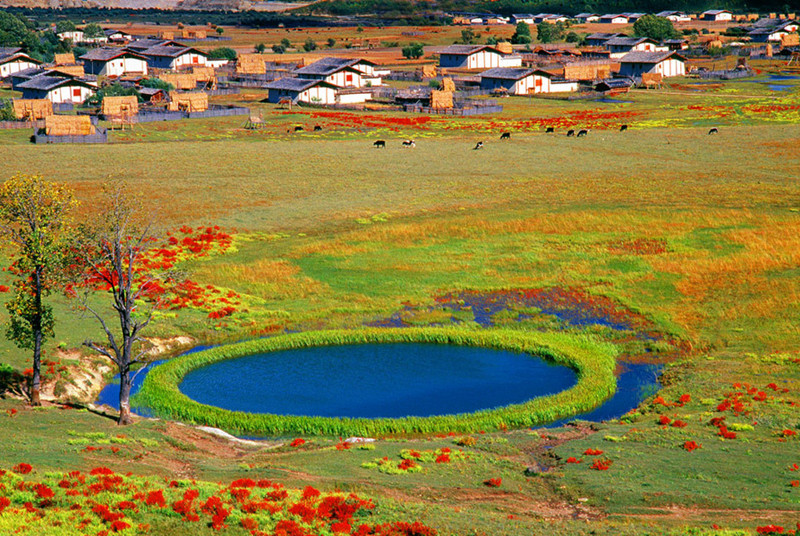
Taiping Lake Forest Park in Mile City, Honghe
Overview Taiping Lake Forest Park (太平湖森林公园, Tàipíng Hú Sēnlín Gōngyuán) is situated in Mile City (弥勒市, Mílè Shì), Honghe Prefecture (红河州, Hónghé Zhōu), a picturesque area in southern Yunnan...
Alu Lake in Luxi County, Honghe
Overview Alu Lake (阿庐湖) is a prominent scenic area located in the northern part of Luxi County (泸西县), Yunnan Province (云南省), about 8 kilometers from the county seat. Nestled...
Nanhu Lake Park in Mengzi City, Honghe
Overview Nanhu Lake (南湖) is located in the southern part of Mengzi City (蒙自市), Honghe Hani and Yi Autonomous Prefecture (红河哈尼族彝族自治州), specifically in the southern region of Wenlan Town...
Shuashui Dragon Pool in Xuanwei City, Qujing
Overview Shuashui Dragon Pool (耍水龙潭) is located at the foot of the mountains on the western side of Damaidi Village (大麦地村) in Xuanwei City (宣威市), Qujing (曲靖), Yunnan Province...
Baishuitang Pond in Luliang County, Qujing
Introduction to the Scenic Spot Baishuitang Pond (白水塘) is located in Sanchahe Town, Luliang County (陆良县), Qujing City (曲靖市), Yunnan Province (云南省). It is 15 kilometers from the county...
Ruyi Dragon Pool in Luliang County, Qujing
Overview Ruyi Dragon Pool (如意龙潭, Rúyì Lóngtán) is a scenic spot located in the Maijie Town (马街镇, Mǎjiē Zhèn) of Luliang County (陆良县, Lùliáng Xiàn), Qujing City (曲靖市, Qūjìng...
Huashan Lake in Zhanyi District, Qujing
Overview Huashan Lake (Huāshān Hú, 花山湖) is located in the northeastern city of Qujing (Qūjìng, 曲靖), Yunnan Province (Yúnnán Shěng, 云南省). It can be reached by following the river...
Taiyehu Lake Park in Luoping County, Qujing
Taiyehu Lake Park (太液湖公园) is located in the center of Luoping County (罗平县), Qujing (曲靖市). It is the site of one of Luoping’s famous historical sights, “Taiye Chengbo” (太液澄波)....
Gandi Yibi Lake in Fugong County, Nujiang
Overview Gandi Yibi Lake, located in Fugong County (福贡县), Nujiang (怒江) Prefecture, Yunnan (云南), is one of the undeveloped soft erosion lakes of the Mingjing Snow Mountain Range (明静雪山系)....
Alpine Lakes in Biluo Snow Mountain in Fugong County, Nujiang
Overview The Nujiang Grand Canyon (怒江大峡谷) is located in the northwest of Yunnan Province (云南省), nestled between Gaoligong Mountain (高黎贡山) and Biluo Snow Mountain (碧罗雪山). It forms the core...
Qilian Lake in Fugong County, Nujiang
Overview Qilian Lake (Seven Lotus Lakes), Fugong County, Nujiang Nestled deep within the Biluoxue Mountain in Pihe Nu Township, Fugong County, Nujiang Lisu Autonomous Prefecture, Yunnan Province, Qilian Lake—also...
Xiaozhongdian Moon Lake in Shangri-La, Diqing
Overview Xiaozhongdian (小中甸) Town is located 37 kilometers from the state capital of Diqing (迪庆), in a high-altitude plateau area. It is intersected by National Road 214 (国道214线), the...
Tips Before Travel
Bring copies of your passport
Don't assume you're restricted to the main hubs of Beijing and Shanghai, our tours can start from any city.
Register with your embassy
For your safety, please register with the Embassy.
Always have local cash
Exchange some local currency for your trip
Our Team
Customize a Trip
Start planning your tailor-made holiday to China by contacting one of our specialists. Once enquired, you’ll get a response within 0.5~23.5 hours.
